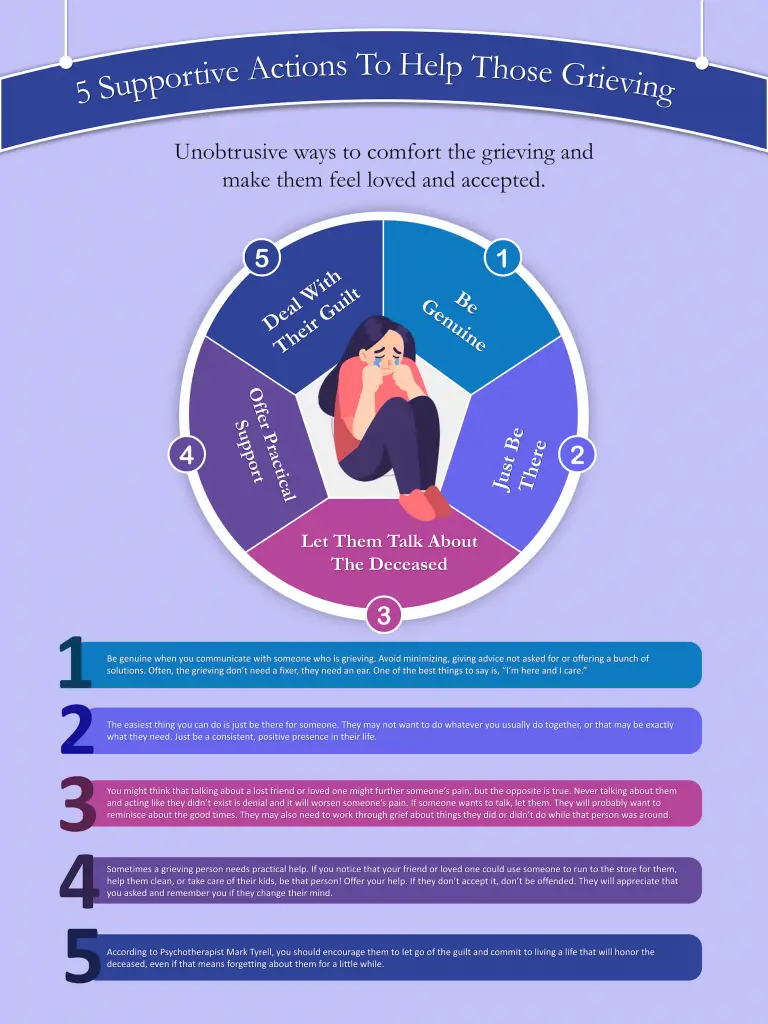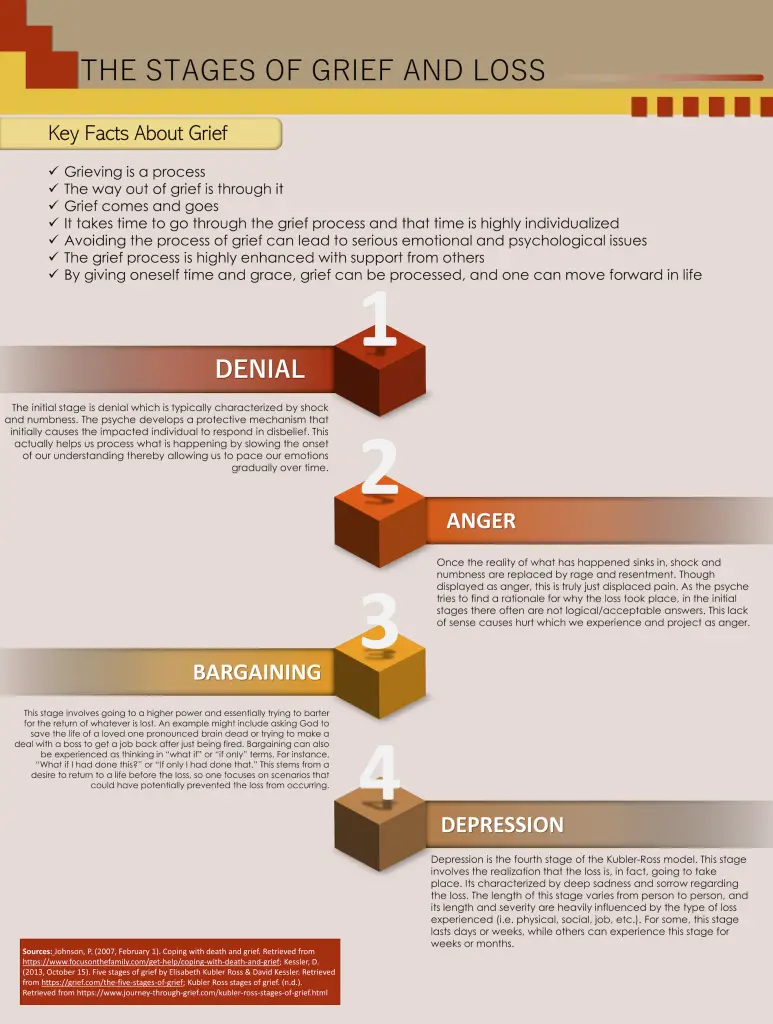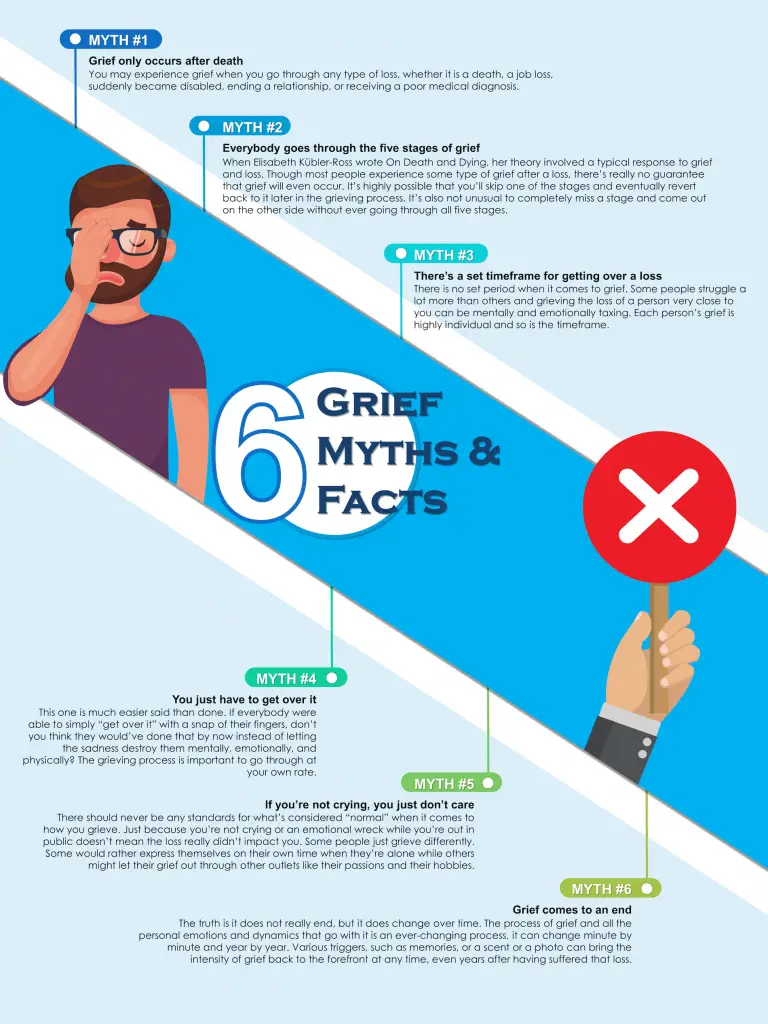Grief is the process of dealing with a loss. Death is not the only cause of grief; we feel grief when we lose anything. This includes, a job, relationships, children leaving the home, moving to a new home or place and even the loss of our identity.
Loss hurts. Loss changes our inner self and the world around us. Loss means change, and something very big changes. When we feel loss, it is important to grieve. Without the grief process you are at a higher risk for sometimes serious emotional and psychological issues including severe depression. Without properly grieving a loss, you may also experience a significant impact on your levels of happiness, mood, wellbeing, and general satisfaction with life.
The grief process can be difficult depending on the loss. It can take a long time, though the time really depends on the loss and the individual experiencing it. There is no wrong way to grieve. One of the most important considerations in grieving is finding comfort whenever and wherever you can.
40 Ways To Find Comfort During Times of Grief
1| Accept Your Feelings
According to the American Psychological Association, through grief you may experience a wide range of emotions from sadness, anger or even exhaustion. All of these feelings are normal and it’s important to recognize, accept and feel your feelings. Talk with someone about your feelings. Cry. Write about your feelings. All these outlets help you to process and accept what you feel about your loss.
2| Allow Yourself To Feel
Sometimes negative feelings like sorrow, sadness, grief, anger can be difficult to feel, so we push them away and stuff them inside. This never works as those feelings will find an outlet, typically in negative ways. So, allow yourself to feel. Tell yourself, “its okay to feel ________” “feeling _________ is natural.” It may be difficult but necessary as a part of the overall healing process.
3| Take Things One Day At A Time
You will have good days and bad days. Don’t spend too much time worrying about when the grief is “over.” Take each day one day at a time or even one minute at a time. Make sure to stay in the present moment, don’t think about the past or future, just be in the here and now. This helps you from becoming overwhelmed and allows you to enjoy some moments of peace, which I promise will come.
4| Write Out All Your Emotions on Paper
One great exercise for difficult emotions is to write them all down. Once they are there and named, they become less scary. It also just feels great to get that load off your chest! So, sit down and write out all your feelings. You can do this daily.
5| Set Aside Time to Do Nothing But Grieve
Sometimes it helps to set aside time to let out an emotion. If you are the type of person who dwells on emotions all day, setting aside time to do nothing but grieve might be a good idea. Let all your grief out for a while and then go on with your day.
If you tend to avoid emotions, this technique might be even more helpful. Facing and accepting your grief and reflecting on what and who you miss for a specified time will prevent you from avoiding these feelings. Try it out!
6| Reach Out To Loved Ones
The grief process is highly enhanced by a strong support system. Do not grieve alone, reach out to friends, family, and even professional help to get you through the toughest of times. When it comes to the losses felt through the current Covid-19 pandemic it is important to remember that as a planet, we are all in this together. There are no longer people unaffected unless they live in the wilderness somewhere. If you need company or someone to vent to, reach out! Schedule a phone call, zoom, or Skype session.
7| Journal
Journal daily. Write down anything that comes to mind. Just write. This helps you process and let go of anger, anguish, and pain.
8| Self-Compassion and Self-Love
Darlene Mininni, PhD, MPH, author of The Emotional Toolkit says that self-compassion improves mental health. Being kind to yourself is one of the best ways to find comfort in times of hardship and sorrow. Be a friend to yourself, say kind things. For example, “I’m so proud of you for finding your inner-strength” or “you are going to be okay” or “I love you.” Try saying these types of things while looking in the mirror.
9| Celebrate Their Life
If the grief is about a death, it is important to have the proper perspective. Is how you are living and coping “celebrating their life” or “mourning their death?” Understand that you must mourn, you must grieve, you must cry and be sad and sorrowful but at some point, if this continues beyond what is reasonable you are no longer in a healthy situation. If at some point you don’t honor your loved ones passing with a mindset of celebrating their life, then you are drowning in mourning their death. Is that what they would want you to do?
10| Practice Mindfulness – Stay Present
Stay in the moment. Focus on the here and now. Don’t dwell on the past or consider the future, just take your days one moment at a time. Focus on what is in that moment, the sights, sounds, smells and everything that surrounds you. Become mindfulness of all that is in that moment. Observe your feelings in that moment, acknowledge each feeling, help yourself heal from one moment to the next.
11| Write letters
Whatever the loss you can write a letter or two to whatever or whomever you’ve lost. Say goodbye, tell it or him or her how you feel, how you will miss them, write them anything you want. You can write a letter to a friend who died but you can also write a letter to a lost dream, a lost job, anything really.
12| Reward Your Progress
If you went from despair to slightly less despair, no routine to some kind of routine, alcohol every day to alcohol only on the weekend, these are great bits of progress that deserve a reward! Order take out, grab ice cream at your weekly grocery store trip, or binge watch your favorite show for a while. Reward progress and it will keep coming.
13| There is No Right or Wrong In Grief
According to Help Guide, “there is no right or wrong way to grieve. Grief does not always unfold in orderly, predictable stages. It can be an emotional rollercoaster, with unpredictable highs, lows, and setbacks.”
14| Lean on Your Faith
In an article on Help Guide, psychologists Jeanne Segal, Ph.D. and Melinda Smith, M.A. say that faith is an incredible source of comfort following a loss. This applies to all types of losses in life, and not only those that are death related. A higher power can be found at churches and temples, but you can also find this source of faith in nature, around trees, lakes, rivers, creeks, and mountains.
15| Be Patient
Patience is hard, but it is a virtue. Success comes most often to those who can delay gratification, so learning patience is very practical. Don’t yearn for the day when the grief will end. Grief is a process, and it can take a long time. The truth is you will not feel bad all the time, relish those moments when you can take a breath and feel ok. Live your life right now and cultivate patience.
16| Reminisce
Whatever you are grieving the loss of, reminiscing can help. Reminiscing is another to process feelings and that is why it is important to reach out and reminisce. Talk to your friends, family, or write in a journal.
17| Practice LOTS of Self Care
Now is the time you need self-care the most. It may be difficult, but eating right, getting exercise, and doing everything you can to get proper sleep, even if that means taking naps is key to the wellbeing of your mind, body, and spirit.
18| Let Go of Guilt
If the loss is great, like a death you may feel guilty for laughing or enjoying a piece of cake, please don’t. You do not have to feel guilty about living, you are alive, you deserve to live a life that is happy. In fact, embrace as many “happy” moments as you can get, these help balance the sorrow and sadness.
19| Relax
Find relaxation outlets to ease the burden you feel and reduce stress. Baths, massages, hiking, reading, anything that makes you relax and pampered can help.
20| Make A Gratitude List
Gratitude is healing. It heals you from within, promotes positivity and helps you to look at the bright side, which may be hard to find in times of great sorrow, sadness, and grief. Make a gratitude list and review it often. Focus on all that you have and all that you are.
21| Take Care of Yourself
Taking care of yourself goes beyond self-care. Self-care is often a time consuming but rewarding treat while taking care of yourself means maintaining your body and mind. Shower and do your hair every day like normal. Eat right and get outside. Don’t let yourself fall into an unhealthy routine.
22| Get Into Hobbies
Find a new hobby or pick up an old one! If you used to waste lots of time playing videos games, for instance, now is the time to pick up a new game and go to town. Order and assemble a bird house and watch the visitors. Learn how to make a coffee table from scratch. Paint, puzzles, drawing, scrapbooking, the list is endless. Hobbies and creative activities help to greatly reduce stress, and this helps you maintain a healthier disposition in mind, body, and spirit.
23| Find a Way to Help Others
One of the best ways to feel better is to help others. Helping others takes you outside of yourself and distracts you from all the negativity you may be feeling. Take care of your friends and family. Volunteer with needy causes. Ask the elderly neighbors if they can use some help. Helping others helps take care of you.
24| Tale a Long Walk In Nature
Nature has a transformative effect on mind, body, and spirit. Breathing fresh air improves your physical health and refreshes the soul. Our bodies need sun. Too little sunlight can even cause depression, so plan at least one daily walk. An even better idea would be to take little walks a few times a day, especially if you spend most of it sitting down.
25| Memorial
The Wendt Center for Loss and Healing recommends some type of memorial ritual in the name of a passed loved one. For example, you can plant a tree in their name, or donate money in their name or even start a charity in their honor.
26| Cry As Much As Needed
Crying can make you feel better. When you need to, let it out. Just let the tears out and don’t apologize. According to Psychology Today, “Emotional tears have special health benefits. Biochemist and “tear expert” Dr. William Frey, at the Ramsey Medical Center in Minneapolis, discovered that reflex tears are 98% water, whereas emotional tears also contain stress hormones that get excreted from the body through crying. After studying the composition of tears, Dr. Frey found that emotional tears shed these hormones and other toxins that accumulate during stress. Additional studies also suggest that crying stimulates the production of endorphins, our body’s natural pain killer and “feel-good” hormones.”
27| Know that Grieving Comes in Waves
You will have good days and bad days. You will spike up, fall down, and then get up again. This is life and you need to be ready for it or it will try to keep you in the low spots. Take advantage of the high times when you feel more like yourself, when you feel happy and calm, this is good, and you should enjoy it.
28| If You Don’t Feel Like Doing Anything, Don’t!
Maybe all these suggestions are making you think you shouldn’t try anything at all. The world is crazy, and you feel overwhelmed. Then don’t do anything! Sit down and relax, take a nap, or zone out in front of the TV. If you don’t feel like doing anything, don’t force yourself!
29| Honor Their Life
If you live a life that the person who passed would want for you, you are then honoring their life. Consider this when you decide how to spend your days, your energy, and your time.
30| Positive Affirmations
Take a few minutes each morning, evening and more as needed to repeat positive affirmations. According to the Huffington Post, “affirmations do indeed strengthen us by helping us believe in the potential of an action we desire to manifest. When we verbally affirm our dreams and ambitions, we are instantly empowered with a deep sense of reassurance that our wishful words will become reality.”
What one needs varies through the process of grief, so affirmations should be personalized to fit those needs. For example, someone who is having a hard time feeling peaceful inside can use affirmations such as these:
- I feel peaceful
- I am safe
- I have support that will see me through
- My anxiety is going away
- I am calm
- Today, I will find peace and calm in the small things
31| Meditate
Meditation is one of the most effective ways to bring inner peace and calm to the mind. You can learn to mediate with apps and there are many guided meditations as well. It is an incredible wellness practice that can really help during times of grief.
32| Try Yoga or Tai Chi
These ancient exercises and wellness practices are both great ways to bring about inner peace and serenity. They induce calm through various poses and breath-work. You don’t need much space and there are many free guided sessions online you can follow in the comfort of your own living room.
33| Speak with a Professional
A qualified mental health provider can bring you comfort and healing. They know just what you need and help you find you find solace even through the toughest of times.
34| Adopt a Pet
Pets are highly therapeutic, and a dog or cat can become your new best friend, someone to greet you at the door when your loved one is no longer there to do so. A loving pet brings comfort, love, and support during the grieving process.
35| Stay Busy
Too much time on your hands can lead you to think too much. So, try to stay busy. Work on a project you have been putting off, reorganize the house, clean out drawers, garden, anything that will keep your time structured and give you some purpose.
36| Listen To Soothing Music
Music is incredibly powerful in how it affects the brain. It can induce a wide range of feelings, including calm, peace, and serenity and even happiness. Create a playlist that calms you and brings you comfort in your time of grief.
37| A Peaceful Image
Find an image that brings you peace. The image can be something from nature, like the sun, ocean or mountains, a favorite object or anything that brings you calm. Enlarge that image and place on a wall in your home where you will see it often. Use visualization when you are not able to see the image to picture it in your mind, and it will bring you peace wherever you are and when you need it most.
38| Exercise
Exercise brings comfort in the form of reducing stress. Moderate activity helps to alleviate anxiety and calms your body, which in turn calms your mind. Regular exercise also helps promote better sleep, which in turn promotes your overall wellness and the ability to heal.
39| Deep Breathing
Deep breathing exercises are great for reducing stress and calming the mind. Try an app that helps you time your breaths.
40| When All Seems Lost, Focus On The Light at The End of The Tunnel
The sorrow and deep sadness you feel right now is very real but remember it will lessen over time. There is a light at the end of the tunnel. Some grief never goes away but it does change over time and lessens in its intensity.
What Next?
REPROGRAM YOUR MIND FOR CALM AND QUITE
How much better could life be if you had a tool that made feeling happy easier…
…and turned it into ‘automatic experience?
The great news is there is a tool that can help you transform feelings of sadness, stress, and even depression…
…into feeling happy, resilient, in control, energized, and ready for the adventure of life!
Subaudible Soundwave Technology is an extremely effective way to create positive change
in the brain.
…Creating new “happiness habits.”
Which helps you develop higher motivation, joy, and a stress-free mind…
…and many other positive changes that makes living your best life more effortless…
Recent studies show the incredible benefits of deep meditation for improving core beliefs, systems, habits, and emotions…
But the problem is that regular meditation won’t get you the desired results because…
There are only a handful of people in the world who can ACTUALLY use this technology to access the part of the brain responsible for “these beliefs, habits and emotions.”
Fortunately, the clinical hypnosis industry recognizes Hypnotherapist to the stars Dr. Steve G Jones as one of them…
When done correctly, it allows you to shift to a lower brainwave state (and a higher state of vibration) bypassing any resistance more quickly and easily, than regular meditation audio tracks.
When you listen to this soothing audio track created by Dr Steve…
The sound waves penetrate directly into your subconscious thoughts while you relax.
This quick and simple process takes place deep inside the brain.
On a purely subconscious level…
…thus causing a stealth psychological response…
That hacks into the mind using the power of suggestion…
…implanting new winning beliefs that advance your life effortlessly multiplying ALL the benefits of regular meditation
This will profoundly change the way you experience yourself and your world…
Giving you a new meta-awareness, perspective and appreciation for life.
While experiencing a soothing feeling of happiness trickle through your body…
Keeping your spirits high no matter what is happening around you…
Don’t miss this limited chance to install a new empowering belief system – Learn more here…
To your happiness and joy….
Grief Infographics










